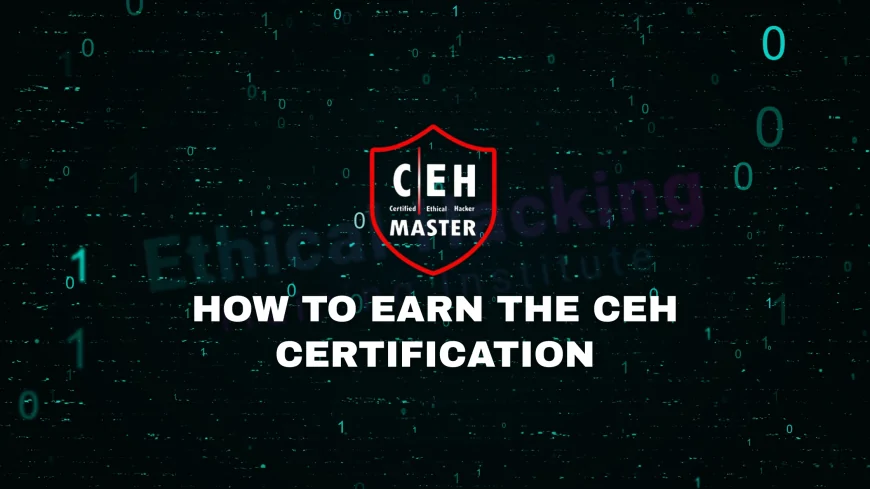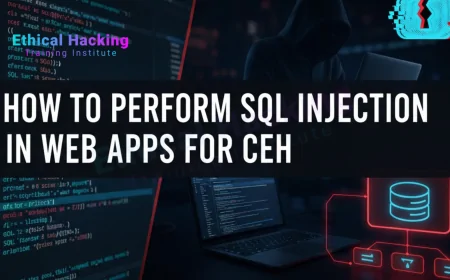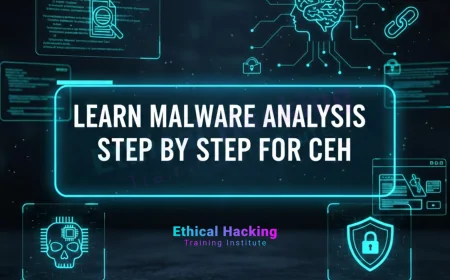Certified Ethical Hacker Cert: How to Earn and What It Means for Your Career | How to Earn the CEH Certification and What It Means for Cyber Professionals
Discover how to earn the Certified Ethical Hacker (CEH) certification, what CEH v13 offers, and how it can advance your cybersecurity career. Includes training options, salary insights, job roles, and FAQs.

Table of Contents
- What Is the Certified Ethical Hacker (CEH) Certification?
- Why Pursue the CEH Certification?
- Eligibility Criteria for CEH
- CEH v13 Exam Format and Details
- Skills and Domains Covered in CEH
- Training Options for CEH
- Popular Tools Used in CEH Training
- Career Benefits of Earning CEH
- Job Roles After CEH Certification
- CEH Salary Expectations in 2025
- CEH vs Other Certifications
- Real-World Application of CEH Skills
- How to Prepare for the CEH Exam
- Cost and Duration of the CEH Course
- Certification Validity and Renewal Process
- Online vs Classroom CEH Training
- Top EC-Council Training Partners
- Challenges and How to Overcome Them
- CEH Industry Recognition
- FAQs
- Conclusion
What Is the Certified Ethical Hacker (CEH) Certification?
The Certified Ethical Hacker (CEH) is a globally recognized certification offered by the EC-Council (International Council of E-Commerce Consultants). It validates an individual’s skills in identifying, assessing, and fixing vulnerabilities in computer systems and networks—legally and ethically.
A CEH-certified professional, also known as a white-hat hacker, is trained to think like a malicious hacker but act lawfully to help organizations strengthen their cybersecurity posture. The CEH program teaches techniques used by cybercriminals, such as scanning, enumeration, exploitation, and privilege escalation—but in a controlled, responsible environment.
Key Features of CEH:
-
Aligned with NICE Framework and DoD 8140/8570 compliance
-
Covers 20 modules, including cloud, IoT, and malware analysis
-
Includes hands-on labs, real-world attack simulations, and Hacking Challenges via CyberQ
-
Prepares professionals for roles like penetration tester, security analyst, and SOC specialist
Why Pursue the CEH Certification?
CEH is often the first major step for aspiring cybersecurity professionals. It is widely recognized by government agencies, Fortune 500 companies, and cybersecurity recruiters as a benchmark for ethical hacking proficiency. The certification is aligned with frameworks such as NICE and DoD 8140/8570.
Eligibility Criteria for CEH
To appear for the CEH exam, you must:
- Complete EC-Council official training OR
- Have at least 2 years of infosec work experience (with application approval)
CEH v13 Exam Format and Details
The exam code for CEH v13 is 312-50. It features:
- 125 multiple-choice questions
- 4-hour exam duration
- Passing score: ~60–85% (depending on question pool)
Skills and Domains Covered in CEH
CEH covers the five core phases of ethical hacking:
- Reconnaissance
- Scanning and Enumeration
- Gaining Access
- Maintaining Access
- Covering Tracks
It also includes malware analysis, cloud security, IoT hacking, and AI/ML in cybersecurity.
Training Options for CEH
- Instructor-Led Online Training
- Self-Paced EC-Council Learning
- In-Person Bootcamps
- Corporate Team Training
Popular Tools Used in CEH Training
Hands-on labs in CEH involve real-world tools such as:
- Nmap – Network scanning
- Metasploit – Exploitation framework
- Wireshark – Packet analysis
- Burp Suite – Web application testing
Career Benefits of Earning CEH
Benefits of CEH include:
- Global job opportunities
- DoD recognition for military and government roles
- Enhanced credibility as a security professional
- Pathway to advanced certs like CHFI and OSCP
Job Roles After CEH Certification
Graduates of CEH can apply for roles such as:
- Ethical Hacker
- Security Analyst
- Penetration Tester
- Cybersecurity Consultant
- Network Security Engineer
CEH Salary Expectations in 2025
In India, average salaries range between ₹6 LPA and ₹18 LPA depending on role, experience, and location. In the US, CEH-certified professionals earn between $75,000–$125,000 annually.
CEH vs Other Certifications
CEH vs OSCP: CEH is better for foundational and corporate recognition, while OSCP is more technical and hands-on. CEH vs CompTIA Security+: Security+ is broader, but CEH focuses specifically on offensive security.
Real-World Application of CEH Skills
CEH training equips professionals to conduct vulnerability assessments, perform penetration testing, and create security reports for real businesses.
How to Prepare for the CEH Exam
- Study CEH official courseware and labs
- Use EC-Council’s CyberQ labs
- Attempt multiple mock exams
- Review NIST and MITRE ATT&CK frameworks
Cost and Duration of the CEH Course
The cost and duration of the Certified Ethical Hacker (CEH) course can vary depending on the training provider, delivery format (online, self-paced, or instructor-led), and geographic location.
CEH Course Cost (Estimated – 2025):
| Region | Cost (in Local Currency) | Cost (USD Equivalent) |
|---|---|---|
| India | ₹45,000 – ₹75,000 | $550 – $900 |
| United States | $1,199 – $2,999 | |
| UK | £900 – £2,000 | $1,100 – $2,500 |
| Global Average | $999 – $1,999 |
Costs often include training material, exam voucher, lab access, and support—but always confirm with your provider.
CEH Course Duration:
| Mode of Study | Duration |
|---|---|
| Instructor-Led (Live) | 5–10 days (40 hours total) |
| Online Self-Paced | 4–6 weeks (flexible hours) |
| Bootcamp (Fast-Track) | 3–5 days intensive |
| University Program Add-on | 6–12 weeks (part-time) |
What’s Included in the Fee:
-
CEH v13 official courseware
-
Access to CyberQ labs (hands-on hacking labs)
-
CEH exam voucher (312-50)
-
One-year access to study portal (if online)
-
Optional: Retake attempts, certification support
Certification Validity and Renewal Process
CEH is valid for 3 years. You need to earn 120 EC-Council Continuing Education Credits (ECEs) to maintain it.
Online vs Classroom CEH Training
- Online: More flexible, often self-paced
- Classroom: Structured environment, instructor access
Top EC-Council Training Partners
- WebAsha Technologies
- InfosecTrain
- Koenig Solutions
- Simplilearn
Challenges and How to Overcome Them
Pursuing the Certified Ethical Hacker (CEH) certification is rewarding but not without its challenges. Many learners—especially those new to ethical hacking—face difficulties ranging from technical complexity to time management. Here's a breakdown of common hurdles and how to effectively tackle them.
1. Technical Complexity
Challenge:
CEH includes advanced topics like cryptography, reverse engineering, buffer overflows, and packet analysis—often overwhelming for beginners.
Solution:
Start with foundational courses (e.g., CompTIA Network+ or Security+) before attempting CEH. Use visual learning tools like YouTube tutorials and lab walkthroughs. Leverage official EC-Council courseware and CyberQ labs for hands-on practice.
2. Hands-On Lab Difficulty
Challenge:
CEH requires practical application of skills using tools like Metasploit, Wireshark, Nmap, and Burp Suite. Learners without real-world experience may struggle.
Solution:
Practice in a safe lab environment (e.g., EC-Council iLabs, TryHackMe, or Hack The Box). Set up a local penetration testing lab using VirtualBox and Kali Linux to simulate attacks and defenses.
3. Retaining Massive Amounts of Information
Challenge:
CEH covers 20+ modules, hundreds of tools, and countless concepts. It's easy to forget crucial content without a structured plan.
Solution:
Use spaced repetition tools (like Anki flashcards) to reinforce learning. Create mind maps for each module. Break study sessions into daily 1–2 hour chunks with focused topics.
4. Exam Pressure
Challenge:
The CEH exam is 4 hours long with 125 questions. Many candidates feel time pressure and stress, which can lead to poor performance.
Solution:
Take regular mock exams to improve your speed and accuracy. Familiarize yourself with the exam environment using EC-Council’s practice tests. Focus on understanding concepts rather than memorizing facts.
5. Finding Quality Study Resources
Challenge:
With so many blogs, forums, and YouTube videos, it can be difficult to identify credible learning materials.
Solution:
Rely on official EC-Council materials, reputed training platforms (like WebAsha, InfosecTrain, or Simplilearn), and certified instructors. Join CEH-focused communities on Reddit, Discord, and LinkedIn to get peer support and trusted recommendations.
6. Balancing Study with Work/College
Challenge:
Working professionals or students often struggle to find consistent time for study.
Solution:
Choose a self-paced online format or attend weekend classes. Set a fixed study schedule (e.g., 1 hour per weekday + 2 hours on weekends). Use productivity tools like Trello or Notion to track progress.
7. Lab Access or Hardware Limitations
Challenge:
Running ethical hacking tools requires good hardware or cloud labs, which not everyone has access to.
Solution:
Use cloud-based labs provided by EC-Council or alternatives like AWS Academy, TryHackMe, or RangeForce. These platforms offer browser-based labs, reducing the need for powerful hardware.
CEH Industry Recognition
CEH is recognized by:
- U.S. Department of Defense (DoD)
- NSA and Homeland Security
- Top global IT firms (IBM, Accenture, TCS, Wipro)
FAQs
1. What is the CEH certification?
It’s a credential offered by EC-Council validating your ethical hacking skills and knowledge.
2. Who should take the CEH exam?
IT professionals, network admins, security analysts, and anyone pursuing a cybersecurity career.
3. Is CEH suitable for beginners?
Yes, though basic knowledge of networking and security is recommended.
4. What is the current CEH version?
As of 2025, the latest version is CEH v13.
5. What is the exam code for CEH?
The exam code is 312-50 for both v12 and v13.
6. What is the cost of CEH in India?
Typically between ₹45,000 and ₹75,000, depending on training provider and package.
7. How long is CEH valid?
CEH is valid for 3 years and must be renewed through ECE credits.
8. How difficult is the CEH exam?
Moderate difficulty. Proper training and practice labs increase your chances of passing.
9. Is CEH better than OSCP?
CEH is ideal for foundational learning and compliance roles. OSCP is more technical.
10. Does CEH guarantee a job?
No certification guarantees a job, but CEH boosts your resume and job opportunities.
11. Can I take the CEH exam online?
Yes, you can take it remotely via EC-Council’s secure platform.
12. Is CEH recognized internationally?
Yes, CEH is globally recognized by employers, governments, and security agencies.
13. Are there any prerequisites?
No formal prerequisites if you take EC-Council’s official training.
14. What score is needed to pass?
The passing score varies between 60% and 85%, based on the difficulty of the question set.
15. What jobs can I get with CEH?
Penetration tester, security consultant, network defender, SOC analyst, and more.
16. What tools are covered in CEH?
Tools like Nmap, Metasploit, Wireshark, Burp Suite, Nikto, and more.
17. How much time is needed to prepare?
2 to 3 months of focused study is typically enough.
18. Can I do CEH without a tech background?
It's challenging but possible with strong motivation and foundational training.
19. Is CEH worth it in 2025?
Yes, CEH remains relevant and respected in the evolving cybersecurity landscape.
20. Where can I get CEH training?
From EC-Council ATCs like WebAsha, Simplilearn, Koenig, and others.
Conclusion
The CEH certification offers a comprehensive introduction to ethical hacking and cybersecurity. Whether you’re entering the field or advancing your current role, CEH equips you with globally respected skills and job-ready expertise. It is a critical stepping stone toward becoming a cybersecurity expert in today’s threat-filled digital world.
What's Your Reaction?
 Like
0
Like
0
 Dislike
0
Dislike
0
 Love
0
Love
0
 Funny
0
Funny
0
 Angry
0
Angry
0
 Sad
0
Sad
0
 Wow
0
Wow
0


















